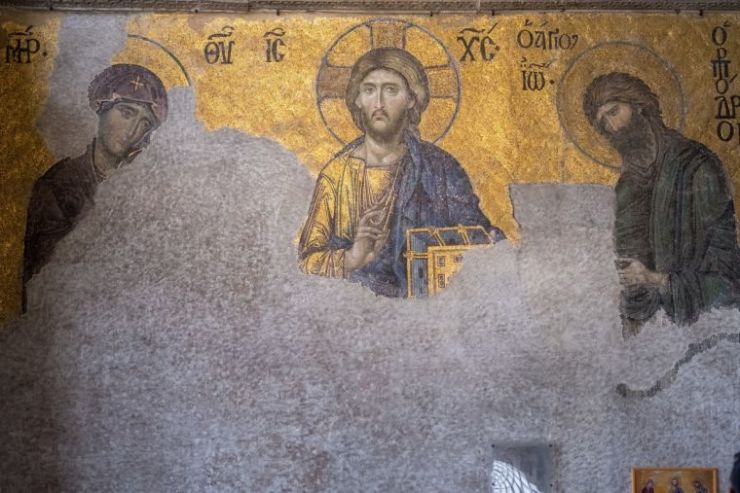
Between Ascension and Pentecost, the surviving eleven apostles replaced Judas and appointed the 13th apostle. This is the story ...
Between Ascension and Pentecost
The word Pentecost comes from the Greek for 'fiftieth' and refers to Feast of Pentecost which happened 50 days after Passover.
One piece of important apostolic business occurred between these two events. The story is told in the first chapter of Acts, that after the Ascension the surviving apostles walked from the Mount of Olives to Jerusalem (Acts 1:12). They went to the upper room of a house in Jerusalem where they joined by 'the women' which included Mary the mother of Jesus and his half-brothers. (Acts 1:13). It says that there they joined together constantly in prayer (Acts 1:14), whilst they waited for the Feast of Pentecost.
Some of them would have been preparing for the Jewish feast of Pentecost, which was one of the three great feats of Judaism. These three great feasts were the Festival of Unleavened Bread (Passover), Festival of Harvest (Pentecost) and Festival of Ingathering (Tabernacles), during which each adult male was required to be present in Jerusalem (Exodus 23:14-17). Knowing this explains why they all stayed in Jerusalem, and did not immediately return to Galilee.
Replacing Judas
On one of these days between the Ascension and Pentecost - it is not clear which one - St Peter stood up among the believers, which numbered about 120, to give a speech. He told the story of how Judas, who had betrayed Jesus, had committed suicide (Acts 1:15-20). He proposed that they elect another one of their number to replace Judas as apostle. The criterion was that the candidate had to be someone who had been with Jesus through his ministry since John's baptism, was a witness to the resurrection, and was still among them. (Acts 1:21-22)
It seems likely that the men selected were from among the 70 (or 72 depending on the manuscript) disciples mentioned in Luke 10:1-24. Jesus said, "God in his wisdom said: 'I will send them prophets and apostles, some of whom they will kill and others they will persecute'" (Luke 11:49, NIV). It may have been from this wider group of seventy disciples that Jesus selected his closest twelve apostles (Luke 6:13).
Two men were proposed. One was called Joseph Barsabbas, who was also known as Justus, and another called Matthias (Acts 1:23). It is not clear if these two were the only ones who fulfilled the criteria, or whether they were the two most suitable candidates from among those who qualified, or if they were simply the only two willing to take the role. The disciples then prayed.
It seems it was not obvious which of the two should be selected, so they prayed and cast lots. Casting lots may seem to us like an odd way to discern the Lord's will to us, but it had biblical precedence. In the Old Testament, Joshua and Samuel are both recorded as casting lots to make decisions, and there is a Proverb, 'The lot is cast into the lap, but the decision is the LORD's alone' (Proverbs 16:33).
The 13th apostle
It was Matthias who was selected to replace Judas. Matthias was the 13th apostle to be appointed, but numbered among the apostles, and his appointment restored the number of apostles to twelve.
Who was Barsabbas?
Joseph Barsabbas was also known as Justus. Many of the Jews had a Hebrew name and a Greek or Roman name. We see this with Saul, which was his Hebrew name, also known as Paul which was his Roman name, and Simon who was also known as Peter. Likewise Justus is likely his Roman name. Other than this, he is not mentioned in the New Testament. The silence of Scripture is often filled in by tradition, and the Christian tradition, is that this Justus went on to become the first bishop of Eleutheropolis, which lies on the road between Jerusalem and Gaza, where he died a martyr. He is considered a saint in the Orthodox tradition and known as Saint Justus of Eleutheropolis, with a feast day on 20 July.
Who was Matthias?
Matthias was appointed by the surviving eleven apostles to replace Judas Iscariot. Matthias is also a bit of a mystery. He was with Jesus all through his ministry but does not appear named in any of the four Gospel accounts. There are different traditions about him. In one tradition he was martyred in Jerusalem, and in another that he went to Cappadocia and died in Georgia. Saint Matthias is considered a saint in the Orthodox and Catholic traditions. He is remembered in the Catholic and Anglican calendars on 14 May. In the Orthodox tradition he is recalled on 9 August.
The Twelve
Matthias, the 13th apostle, restored the number of apostles to twelve. The idea of twelve apostles is probably symbolic of the twelve tribes of Israel. In Acts 6:2 the apostles are once again referred to as 'The Twelve', which included Matthias. The story is then told that they appointed the seven deacons Stephen, Philip, Prochorus, Nicanor, Timon, Parmenas, and Nicolaus.
Other apostles
By Acts 14:14, Paul and Barnabas are called apostles. Paul regarded himself as Apostle to the Gentiles (Romans 11:13) and wrote that he was 'the least of the apostles, unworthy to be called an apostle, because I persecuted the church of God' (1 Corinthians 15:8-9).
James, half-brother of Jesus, is called an apostle by St Paul in Galatians 1:19, and possibly in in 1 Corinthians 15:7.
Paul wrote to the church at Ephesus that the Church was 'built on the foundation of the apostles and prophets, with Christ Jesus himself as the chief cornerstone' (Ephesians 2:20) and went onto explain that that some were called to be apostles, some to be prophets, some to be evangelists and some to be pastors and teachers (Ephesians 4:11). This seems to suggest that being an apostle was a calling and apostles will be part of Church life.
There is an intriguing verse at the end of Romans 16:7 where St Paul writes, 'Greet Andronicus and Junia, my relatives who were in prison with me; they are prominent among the apostles, and they were in Christ before I was.' Andronicus and Junia are likely a married couple, like Priscilla and Aquila mentioned in Romans 16:3. The verse is ambiguous. Some people read it to mean that they were well-known and prominent people to the apostles, but others read it to mean that they themselves were prominent apostles, and if this is so, it means that Junia is the only named female apostle in the New Testament. Those who support female ministry jump on this possibility, and those who do not support female ministry highlight the ambiguous nature of the text.
It is not clear if the idea of needing exactly twelve apostles was dropped as the Church developed, or alternatively if the process of maintaining twelve apostles was continued and these people replaced other apostles who died or were martyred to maintain the number at twelve. However, some self-proclaimed apostles were not recognised as such, and there are warnings against false apostles in 2 Corinthians 11:13 and Revelation 2:2. This perhaps only makes sense if the apostles were not limited to twelve. The appointment of the seven deacons mentioned in Acts 6:2 may also suggest that Jesus did not leave a fixed blueprint for the structure of the Church, and they developed the model as the Church grew.
The term apostle as used in Church history
Throughout the history of the Church the term apostle has been applied to people who brought the Gospel to new areas. Sometimes Mary Magdalene is called the Apostle to the Apostles because she was at the empty tomb and proclaimed the good news of the resurrection to the surviving eleven apostles.
Apostles through history
The fourth century St Frumentius is sometimes known as the Apostle to Ethiopia. The fifth century St Patrick is considered the Apostle to Ireland. The sixth century St Augustine of Canterbury is sometimes considered the apostle to the English. The eighth century Saint Boniface is known as the Apostle to the Germans. The ninth century Saints Cyril and Methodius are sometimes known as the Apostles to the Slavs. In more recent history the English Primitive Methodist evangelists John Ride (1790-1862) and Thomas Russell (1806-1889) are sometimes known as the Apostles to Berkshire. The Welsh John Griffith (1831-1912) was known as the Apostle to Central China.
Ascensiontide
In the Christian calendar Ascension Day falls 40 days after Easter, and Pentecost is 10 days after that, meaning Pentecost Sunday is seven weeks after Easter Sunday. The Sunday between Ascension and Pentecost is called the seventh Sunday of Easter, or the Sunday of Ascensiontide. In churches which follow the lectionary, the story of Matthias is often recalled on that Sunday between Ascension and Pentecost, which in 2024 is 12 May.
Republished from Christian Today UK.




